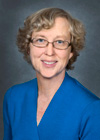 The National Science Foundation (NSF) Directorate for Computer and Information Science and Engineering (CISE) is pleased to announce a distinguished lecture on Wednesday, May 20, 2015 at 2:00 pm EST by Dr. Kathy Yelick titled CDL – More Data, More Science and……Moore’s Law?.
The National Science Foundation (NSF) Directorate for Computer and Information Science and Engineering (CISE) is pleased to announce a distinguished lecture on Wednesday, May 20, 2015 at 2:00 pm EST by Dr. Kathy Yelick titled CDL – More Data, More Science and……Moore’s Law?.
Kathy Yelick, a newly elected Computing Community Consortium (CCC) Council member who will start her term in July, studies programming languages, compilers, and algorithms for parallel machines. She currently leads the Computing Sciences directorate at Lawrence Berkeley National Laboratory (LBNL), which includes National Energy Research Scientific Computing Center, Energy Sciences Network and a research division of scientists and engineers in applied math, computer science and computational science. She earned her Ph.D in Electrical Engineering and Computer Science from MIT and has been a professor at UC Berkeley since 1991 with a joint research appointment at LBNL since 1996.
Abstract
In the same way that the Internet has combined with web content and search engines to revolutionize every aspect of our lives, the scientific process is poised to undergo a radical transformation based on the ability to access, analyze, and merge large, complex data sets. Scientists will be able to combine their own data with that of other scientists to validate models, interpret experiments, re-use and re-analyze data, and make use of sophisticated mathematical analyses and simulations to drive the discovery of relationships across data sets. This “scientific web” will yield higher quality science, more insights per experiment, an increased democratization of science, and a higher impact from major investments in scientific instruments.
At the same time, the traditional growth in computing performance is slowing, starting with flattening of processor clock speeds, but eventually also in transistor density. These trends will limit our ability to field some of the largest systems, e.g., exascale computers, but the cost in hardware, infrastructure and energy will limit the growth in computing capacity per dollar at all scales. Fundamental research questions exist in computer science to extend the limits of current computing technology through new architectures, programming models and algorithms, but also to explore options for post-Moore computing. While the largest computing capabilities have traditionally been focused on modeling and simulation, some of the data analysis problems arising from scientific experiments will also require huge computational infrastructure. Thus, a sophisticated understanding of the workload across analytics and simulations is needed to understand how future computer systems should be designed and how technology and infrastructure from other markets can be leveraged.
In this talk I will describe some examples of how science disciplines such as biology, material science and cosmology are changing in the face of their own data explosion, and how mathematical analyses, programming models, and workflow tools can enable different types of scientific exploration. This will lead to a set of open questions for computer scientists due to the scale of the data sets, the data rates, inherent noise and complexity, and the need to “fuse” disparate data sets. Rather than being at odds with scientific simulation, many important scientific questions will only be answered by combining simulation and observational data, sometimes in a real-time setting. Along with scientific simulations, experimental analytics problems will drive the need for increased computing performance, although the types of computing systems and software configurations may be quite different.
To view the webinar of this lecture, please register here by 11:59 PM EST on Tuesday, May 19, 2015.









